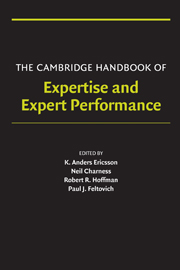Book contents
- Frontmatter
- Contents
- Acknowledgments
- Contributors
- PART I INTRODUCTION AND PERSPECTIVE
- PART II OVERVIEW OF APPROACHES TO THE STUDY OF EXPERTISE – BRIEF HISTORICAL ACCOUNTS OF THEORIES AND METHODS
- 4 Studies of Expertise from Psychological Perspectives
- 5 Educators and Expertise: A Brief History of Theories and Models
- 6 Expert Systems: A Perspective from Computer Science
- 7 Professionalization, Scientific Expertise, and Elitism: A Sociological Perspective
- PART III METHODS FOR STUDYING THE STRUCTURE OF EXPERTISE
- PART IV METHODS FOR STUDYING THE ACQUISITION AND MAINTENANCE OF EXPERTISE
- PART V DOMAINS OF EXPERTISE
- PART VI GENERALIZABLE MECHANISMS MEDIATING EXPERTISE AND GENERAL ISSUES
- Author Index
- Subject Index
- References
4 - Studies of Expertise from Psychological Perspectives
from PART II - OVERVIEW OF APPROACHES TO THE STUDY OF EXPERTISE – BRIEF HISTORICAL ACCOUNTS OF THEORIES AND METHODS
- Frontmatter
- Contents
- Acknowledgments
- Contributors
- PART I INTRODUCTION AND PERSPECTIVE
- PART II OVERVIEW OF APPROACHES TO THE STUDY OF EXPERTISE – BRIEF HISTORICAL ACCOUNTS OF THEORIES AND METHODS
- 4 Studies of Expertise from Psychological Perspectives
- 5 Educators and Expertise: A Brief History of Theories and Models
- 6 Expert Systems: A Perspective from Computer Science
- 7 Professionalization, Scientific Expertise, and Elitism: A Sociological Perspective
- PART III METHODS FOR STUDYING THE STRUCTURE OF EXPERTISE
- PART IV METHODS FOR STUDYING THE ACQUISITION AND MAINTENANCE OF EXPERTISE
- PART V DOMAINS OF EXPERTISE
- PART VI GENERALIZABLE MECHANISMS MEDIATING EXPERTISE AND GENERAL ISSUES
- Author Index
- Subject Index
- References
Summary
Introduction
The study of expertise has a very long history that has been discussed in several other chapters in this handbook (Ericsson, Chapter 1; Amirault & Branson, Chapter 5). This chapter focuses on the influential developments within cognitive science and cognitive psychology that have occurred over the last three decades. Our chapter consists of two parts. In the first part we briefly review what we consider the major developments in cognitive science and cognitive psychology that led to the new field of expertise studies. In the second part we attempt to characterize some of the emerging insights about mechanisms and aspects of expertise that generalize across domains, and we explore the original theoretical accounts, along with more recent ones.
The Development of Expertise Studies
In this handbook there are several pioneering research traditions represented that were brought together to allow laboratory studies of expertise, along with the development of formal models that can reproduce the performance of the experts. One early stream was the study of thinking using protocol analysis, where participants were instructed to “think aloud” while solving everyday life problems (Duncker, 1945), and experts were asked to think aloud while selecting moves for chess positions (de Groot, 1946/1965; Ericsson, Chapter 13). Another stream developed out of the research on judgment and decision making, where researchers compared the judgments of experts to those of statistical models (Meehl, 1954; Yates & Tschirhart, Chapter 24).
- Type
- Chapter
- Information
- Publisher: Cambridge University PressPrint publication year: 2006
References
- 218
- Cited by

